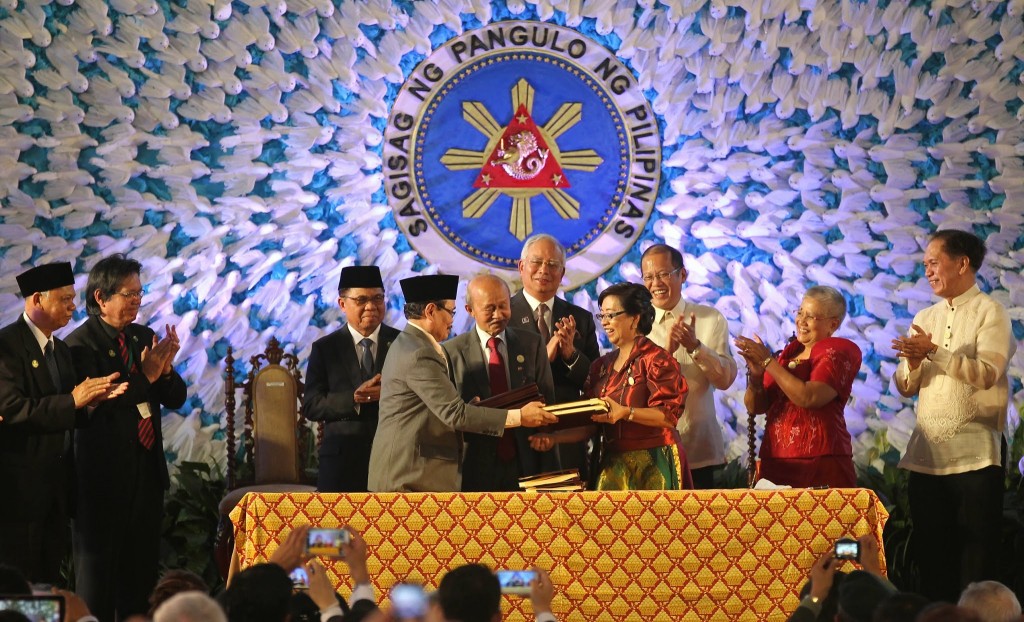Headline
Palace says more Filipinos need to understand importance of BBL

President Benigno S. Aquino III and Malaysian Prime Minister Najib Razak witness MILF Peace Panel chairman Mohagher Iqbal, GPH Peace Panel chairperson Professor Miriam Coronel-Ferrer and Malaysian facilitator Tengku Ghafar affix their signature to the Comprehensive Agreement on the Bangsamoro in a ceremony at the Kalayaan grounds of the Malacañan Palace on Thursday (March 27). Also in photo are MILF chairman Al Haj Murad Ebrahim and Presidential Adviser on the Peace Process Secretary Teresita Quintos-Deles. (Photo by Gil Nartea/ Robert Viñas/ Rodolfo Manabat/ Malacañang Photo Bureau)
MANILA — Malacanang on Thursday said there is still a need to fully inform the public on the importance of enacting the proposed Bangsamoro Basic Law (BBL).
This after result of a Pulse Asia Survey showed that 44 percent of Filipinos or 4 out of 10 Filipinos are against the passage of BBL.
”Ang tugon natin diyan ay ‘yung ibayong pagsisikap na ipaliwanag at ipaunawa sa ating mga mamamayan ‘yung kahalagahan ng pagkakaroon ng Bangsamoro Basic Law bilang mahalagang component o bahagi ng ating prosesong pangkapayapaan,” Presidential Communications Operations Office (PCOO) Secretary Herminio Coloma Jr. said.
(Our response is intensified efforts to explain and help people understand the importance of having the Bangsamoro Basic Law as an important component or part of the peace process.)
Coloma said they believe that there is enough time from now until the resumption of hearings in Congress for lawmakers to discuss BBL measures citing reports that the House of Representatives will resume its hearings on April 8 while the Senate has scheduled it for April 6 or 20.
”Kaya’t nananalig ang administrasyon na sa panahong ito ay mayroong sapat na pagkakataon para magkapaliwanagan, para magkaroon ng dagdag na paglilinaw doon sa mga hindi masyadong malinaw pa na mga aspeto nito. At alalahanin din natin na dumaan ito sa isang proseso na sinikap talagang makapagbuo ng isang makabuluhang Bangsamoro Basic Law,” he said.
(So the administration has faith that this time there’s enough opportunity to explain [each other’s side] to shed more light to those who still don’t completely understand [the BBL]. We should also remember that [the BBL] underwent a rigorous process to create a meaningful BBL.)
According the Pulse Asia Survey, conducted from March 1-7, some 88 percent of Filipinos have heard, read or watched something about the BBL.
Based on geographic location, those from Mindanao have the highest awareness at 93 percent followed by those from the National Capital Region (NCR) and balance of Luzon (BL), both at 87 percent; and the Visayas, 82 percent.
The Aquino administration maintained that approval of the BBL is an important component in achieving peace in Mindanao.
The survey, however, showed that 44 percent of the respondents are against it, 36 percent are undecided and 21 percent agree for its passage.
Among those who disagree for the BBL passage, respondents from Mindanao posted the highest percentage at 62 percent followed by those from NCR, 52 percent; Visayas, 43 percent; and rest of Luzon, 32 percent.
Coloma stressed that there was enough preparation and it passed several processes and scrutiny before the draft BBL was submitted to Congress in September 2014.
In October 15, 2012, the Philippine government and the Moro Islamic Liberation Front (MILF) signed the Framework Agreement on the Bangsamoro, the preliminary peace agreement.
The last of the four annexes of the Framework Agreement was signed in January 2014 and the Comprehensive Agreement on the Bangsamoro (CAB) was signed in Malacanang in March of the same year.
The agreement was targeted to provide political stability and economic growth in the current Autonomous Region in Muslim Mindanao (ARMM), which will be called Autonomous Government of Bangsamoro once the new political entity is put into place in 2016.
Under the agreement, the government and the MILF will have to share the revenues from the resource-rich region as well as on governmental power in the area.
However, passage of the BBL now faces possible delay after the death of 44 Special Action Force (SAF) policemen during their operation to arrest wanted terrorists – Malaysian Zulkifli Bin Hir, alias Marwan, and Filipino bomber Ahmad Akmad Batabol Usman, alias Basit Usman, in Mamasapano, Maguindano last January 25.
The operation, dubbed Oplan Exodus, also resulted in the death of four civilians and 18 MILF combatants.
Investigation by the police’s Board of Inquiry (BOI) showed, among others, the lack of preparation in the operation and authorities, including those involved in the peace process, were not informed.
Coloma said the incident made many sectors become more aware on the proposed BBL.
”Sa aming palagay, magandang pagkakataon ‘yung naganap ‘yung kasalukuyang kaganapan na kung saan ay maraming sektor ang naging mas mulat hinggil dito (at) mas maraming nagtatanong, mas marami rin tayong makukuhang kasagutan at pagpapaliwanag para nga sa dulo ay magkaroon ng katanggap-tanggap na Bangsamoro Basic Law dahil ‘yan naman ang essence of a healthy democracy,” he added.
(In our opinion, the recent situation is a good opportunity where a lot of sectors were more enlightened and [more people are] asking questions, so we also get more answers and explanations so that in the end we will have an acceptable Bangsamoro Basic Law because that is the essence of a healthy democracy.)





















